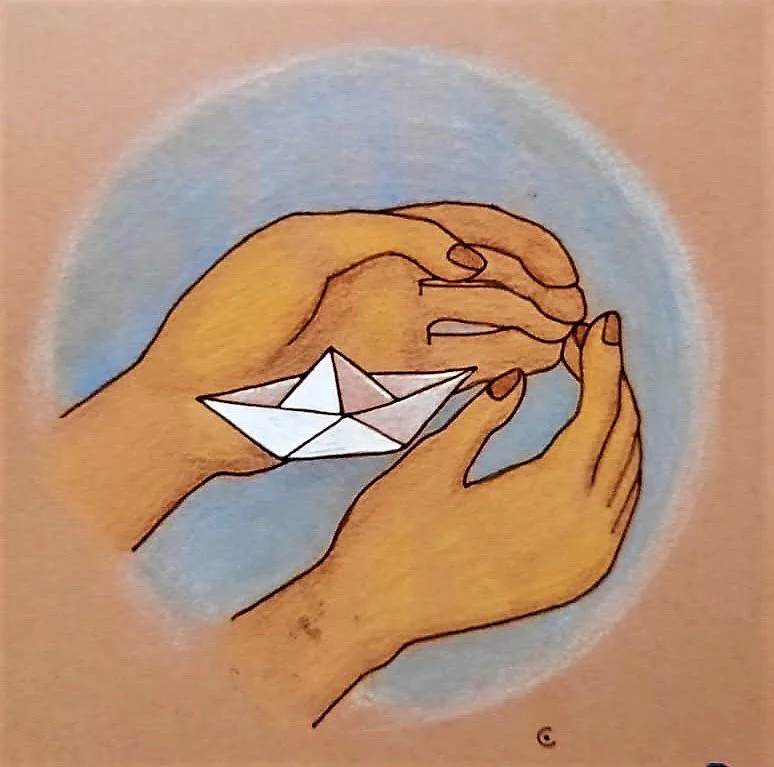A HOME THAT’S ALIVE
A HOME THAT’S ALIVE
I turned up at the door of Maria Skobtsova House on an October afternoon not quite knowing where I was going, as it was my first volunteering experience, and also my first long stay outside Barcelona, my hometown. The most relevant instruction I had received before coming was, in the event, the only one that mattered: "We will not ask you to speak French or English, nor do we expect you to have any previous training or experience: we expect nothing more except that you consider and treat the people who live here as who they are, your sisters and brothers, all children of the same Father".
My faith in God had only begun to grow in me a few months before coming, so it was a surprising and previously unknown message to me. I felt a little insecure, but above all, I felt an overflowing joy, that special joy that comes from the spirit. As soon as I crossed the threshold, when Rachel and Joseph greeted me warmly in that photo-filled hallway, I recognised that same joy, and I knew I was in the right place.
The house is a place of welcome for people who need a safe place to live while they are going through a very complex time in their lives. These are people experiencing profound change, often having been forced to abandon practically everything that structured their lives before they began their journey in search of a more dignified and fairer life for their families. The house is reserved for women alone, or for women with children, people who are in a particularly vulnerable and exposed position on a migration journey filled with risk. Each person brings their own story. A backpack loaded with their pain, their grief, their unmet needs, their complaints, pleas and cries; it was essential to learn how to be supportive without sinking into one's own sadness; to discover how to situate oneself in relation to the stories of suffering, which sometimes felt so far from one's own.
However, if there was one thing that stood out in all the women I met there, beyond the pain and fear, it was the light of hope. It appeared at the end of every story they told where strength had overcome despair, where they had summoned all their courage to get out of an unjust situation, where love for their children or loved ones had driven them to undertake an impossible journey. That light, which can come from nowhere else but the spirit, continued to beat every day and every night: in every attempt to cross to the UK, in every shared dinner, in every silent prayer. Beyond their differences, and despite the shadow that could weigh on their lives, each person was finding their own way to bring their particular portion of light into the house.
The emotional atmosphere in the house could be described as a colourful combination of stress, joy, sadness, fear, humour, conflict and constant reconciliation. It is not easy for anyone to live with a dozen people who do not share the same language, culture or sometimes even the most important values. As a permanent presence there, I learned to situate myself in this roller coaster of living in a community. At times, I became a busy and maternal hostess; at others, I felt like a loved and spoiled youngest daughter. Sometimes, no one seemed to want to listen to the other person; at other times, an atmosphere of intimacy was generated through a simple word or by laughing together at a joke. Sometimes, we served in silence, almost invisible; other times, we shared the chores in joyful company. Every day, a bit of everything, or everything at once.
In living together, it seems that the heart of each guest is in tune with the heartbeat of the life of the house itself, as if it had its own entity. It is easy to recognise the holy spirit burning within these yellow walls: in all the drawings on the wall, in the pantry always stocked to offer yet one more dish; in the cooker which cooks recipes from all corners of the world, to be shared around the dinner table, leaving aside any differences. In the hugs to wish each other luck, in the prayers for each other's lives, in the small gestures of care. In the tears as we say goodbye to each other, not knowing when we will see each other again, feeling that each one takes a part of the other with them.
It is the house that embraces each person who enters its door, that provides security and nourishment, that consoles and offers care. It is the house that prays for all, and it is the house that weeps when, with the inexorable passage of time, the hour comes for us to leave. Thanks to the willingness to live together in true communion, overcoming any differences that might divide us, guests and volunteers are one and the same, sisters and brothers sitting together at table, serving one another. Thanks to the endless efforts of the people who have made the house their life project, and dedicate their efforts and energy every day to keep the true spirit burning in it, this house will breathe and its heart will continue to beat. It also welcomed me, matched my heartbeat with its own, and made me feel loved and cared for. I will always be grateful to have been part of this living house, alongside so many brave and incredible people. Despite the passage of time, my heart won’t forget Maria Skobtsova House, a home that’s alive.
CLARA


